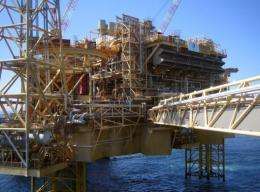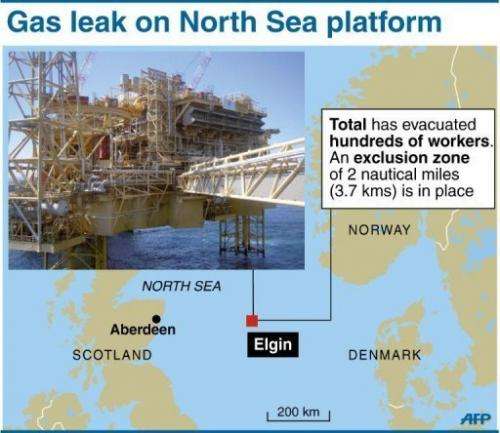Gas explosion risk at stricken North Sea rig

French energy giant Total readied a mini-submarine in a bid to inspect a huge gas leak at a North Sea rig but played down fears of a massive explosion.
A ship carrying the remote-controlled sub, as well as two firefighting ships, have sailed into the vicinity of the Elgin platform, which lies 150 miles (241 kilometres) off the coast of eastern Scotland.
An expert warned that gas pouring from the platform could ignite with catastrophic consequences if it came into contact with a flare left burning when 238 workers were evacuated from the rig on Sunday.
But a Total spokeswoman said the wind was not currently blowing the cloud of highly flammable gas towards the flare, despite it being less than 100 metres (330 feet) above the leak.
"We don't see it as a risk because of the prevailing winds and the location of the flame in relation to where the gas leak is," the spokeswoman said.
Total called in an exploration ship carrying the remote-controlled mini-sub, which is equipped with cameras, late Tuesday. Its task is to assess the underwater leak on the rig.
On Wednesday, the ship, the Highland Fortress, lay just outside a two-nautical mile (3.7 kilometres) exclusion zone around the platform, along with two firefighting vessels, said Total.
The risk is that if the wind currently blowing the gas away from the flare dropped, the gas could ignite, said Simon Boxall, an oceanographer at Southampton University in southeast England.
"The chances are the gas will disperse quite quickly," Boxall told AFP.
"But if the wind stops completely, gas will build up towards the flame. This could create an explosion.

"At the moment things are working on the side of Total," he added. "The flare is at the highest part of the rig, and the gas itself... is fairly heavy, so it's lying low."
But the offshore branch of the RMT union warned that if the leak did ignite, the results would be devastating.
"Total acted very swiftly in getting everyone off, but the potential still exists for catastrophic devastation," said offshore organiser Jake Molloy.
But he added: "If the gas cloud somehow finds an ignition source we could be looking at complete destruction."
While Total says the leak is the most serious problem it has faced in the North Sea for a decade, it insists the environmental impact is minimal.
The company said it was considering various ways of stopping the leak.
"There has been some speculation about a second well being drilled," to stop the flow of gas, a spokesman said.
"But we believe it could take up to six months if that was the preferred option," he added.
The company's shares, which plunged 6.0 percent on the French stock exchange on Tuesday, finished down a further 1.40 percent at just over 38 euros on Wednesday.
Flares on offshore platforms are commonly used to burn off excess gas that the rig does not use or capture, but it was not clear whether Total had left the flame burning intentionally when the platform was abandoned.
More than 300 people have been evacuated from two rigs since the leak was discovered on Sunday and a six-mile long sheen of gas condensate has spread on the water nearby.
Shell has shut down production at its Shearwater platform and Noble Hans Deul rig four miles away and evacuated 85 crew as a precautionary measure.
The last major accident in the North Sea was in 1988, when the Piper Alpha oil platform operated by the US-based Occidental Petroleum exploded, killing 167 people.
The incident comes two years after BP's reputation was badly hit by a blowout at the Deepwater Horizon oil drilling rig in the Gulf of Mexico.
That explosion killed 11 crewmen and caused oil to gush into the water triggering the worst environmental disaster in US history.
(c) 2012 AFP




















